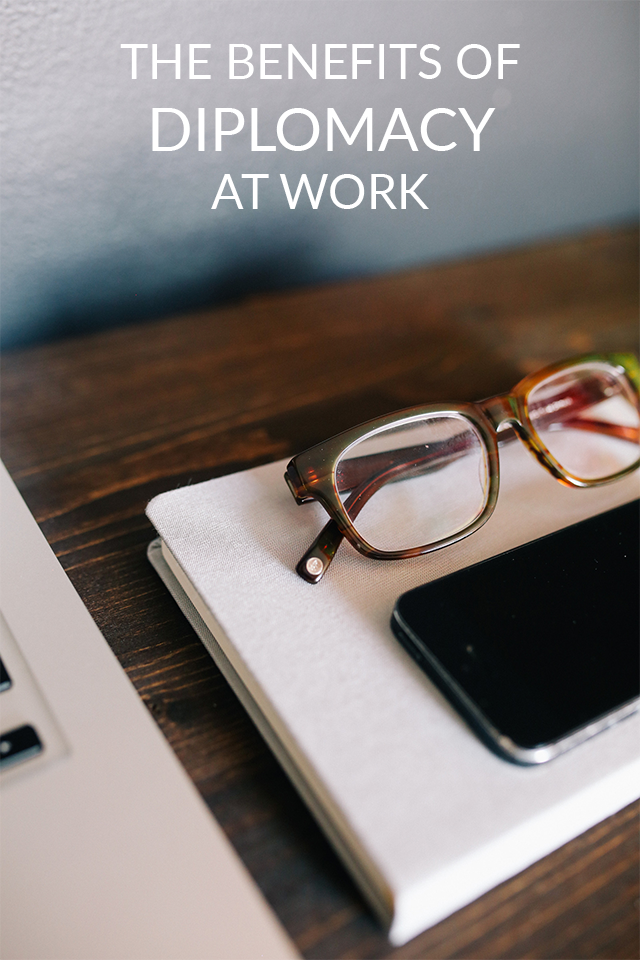
As much as I enjoyed the college life, there are some days when I wish it had better prepared me for the workforce. No college textbook taught me how to fix a paper jam in a temperamental copier, or how to be flexible when a last-minute meeting was scheduled during my only prep time, or what to do when my carefully planned lessons fell apart.
But most importantly, I wish my university had taught me some of the skills that would have come in handy my first year out of college.
I have learned from experience that being diplomatic in the workplace is invaluable. There are countless people you must work with every day, from your business managers, to your bosses, to your colleagues, and everyone in-between. Being diplomatic refers to one’s ability to navigate social situations with grace, so that no hard feelings arise while finding a balance between your needs and those of the people you work with.
To be diplomatic, you need to understand and define your expectations clearly. What is it that you need, and what needs to be done in order to achieve this goal? At the same time, you must consider everyone else’s perspective: some tasks require different levels of help, and finding a balance between what everyone wants is crucial.
For example: suppose you need some new equipment for your office space, whatever it may be. Consider specifically what you need, and the kind of help needed to install it. Speak to your supervisor and outline your request, then ask if it is a possibility. If yes, take the next steps to ensure that the right people are willing and able to help you (because let’s face it, if we were capable of doing each task ourselves, the world would be a very different place indeed). Talk with these individuals, ask for their help, and wait for their response. Chances are, most people feel honored when you admit you aren’t able to do everything yourself and want their expertise on a subject you know little about.
If no, reevaluate your request. If it is unreasonable, chances are it will be hard to get people to commit to what you need. Can it be modified, so that you can meet your supervisor halfway? Sometimes it is all about baby steps and making sure that trust is established between all applicable parties.
Being diplomatic also comes in helpful when working with difficult situations. Knowing how (and when) to step in and soothe ruffled feathers is a skill everyone should try to hone. If there is miscommunication between two individuals, sometimes an objective third-party is all it takes to turn the situation around.
When an opinion is requested of you – as this third-party – it is important to weigh the pros and cons. How can you respond in a way that makes both individuals feel that their voice is being heard? From a personal standpoint, this is something I have to do every day. I will have two students in disagreement over a project or the like, and knowing how to intervene is half the battle. Being diplomatic allows me (as the authority in my classroom) the chance to express my views, while acknowledging my students’ concerns and trying to meet their needs. It is no different with colleagues.
Try to remember, however, that things don’t always go as planned. Smile, be gracious, and move on with your duties. People recall times when others are less than cordial, and ultimately, this can be a reflection on one’s diplomacy skills. Learn how to roll with the punches – after all, this too is a part of diplomacy. Obviously you don’t want people to walk all over you, but being flexible is important and is often the first step in achieving a common ground with the individuals you work with.
Ultimately, to be diplomatic is to understand that everyone has a different perspective or take on any given task. This truly will allow you to do your best at work. Life throws curveballs, and the workplace is no different. Learning how to navigate your requests, the requests of others, and difficult situations is the key to diplomacy.
I’m not an expert by all means (and I’m certainly still working on this myself!), but I know that being diplomatic has helped me greatly over the years as I’ve navigated many tasks in my profession. With experience, you too can have more confidence in working with the many types of people you encounter every day at work.
[Tweet “Learning to be diplomatic will help you get ahead in your #career.”]
